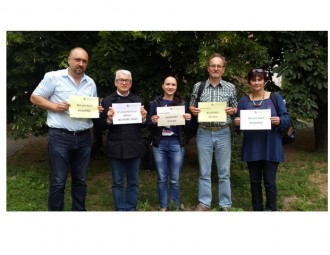Ulad Vialichka: Ukraine and Georgia deserve a visa-free regime with the EU

A delay in granting a visa-free regime will cause a significant blow to the pro-European forces not only in Ukraine and Georgia, but also in all the countries of the Eastern Partnership.
Ukraine and Georgia are expecting visa-free regime with the European Union any day now. Kiev and Tbilisi have met all the conditions for visa-free regime that the EU set.
It came as a sheer surprise: it turns out that Germany and France are elaborating a regulation according to which certain countries of the EU will be able to suspend visa-free regime. The reason for this is the fear that the rapid and "package" endowment of a visa-free regime with Georgia, Ukraine, and Kosovo will worsen security situation. Die Welt informs that the decision on the visa-free regime is slowing down: The EU Justice and Home Affairs Council won't endorse the abolition of visas for Ukraine and Georgia in the coming week.
Berlin and Paris insist that by the time of the introduction of visa-free regime a suspension amendment should be added to the legislation. Besides, the abolition of visas should be introduced not for all countries at the same time, but for each country separately.
Failure to comply with the EU commitments will be a "cold shower" for the pro-European forces in all the countries of the Eastern Partnership, thus causing additional ideological attacks from the Russian media.
"Eastern Partnership" Civil Society Forum is convinced that the European Union must fulfill its part of the arrangements, giving Georgia and Ukraine visa-free regime without additional terms. The statement of the Steering Committee of the EaP Civil Society Forum issued today recognizes "the legitimate right and urgent need of the EU to control its external borders”; however, “Ukraine and Georgia are the Eastern Partnership members who fully complied with the requirements of the Visa Liberalization Action Plans (VLAPs) and are not posing any essential migration challenges to the EU, which was confirmed by the European Commission. The revision of the temporary suspension mechanism will automatically apply to all countries enjoying the visa waiver with the EU, there is no practical need to combine such amendments with the decision on visa liberalisation for Georgia and Ukraine."
Ulad Vialichka, the co-chair of the Eastern Partnership Civil Society Forum Steering Committee, shares his viewpoint on the matter shares with the “EuroBelarus” Information Service.
- This week, Georgia and Ukraine are waiting for the EU decision on granting them a visa-free regime, but the European Union is hesitating. There is information on introducing additional terms for granting a visa-free regime, which are not specified above.
However, Georgia and Ukraine have come a long way of negotiations on visa-free regime, fulfilling all the conditions of the European Union and they deserve it. Therefore, both countries seriously expect the EU to implement the agreements. An attempt to slow down the process and digress from the original agreement will signal double standards. In addition, it will certainly cause a wave of discontent in Ukraine and Georgia and will be a signal to all anti-European forces in the Eastern Partnership countries and Russia itself. The EU's refusal to grant visa-free regime will cause a significant blow to the European forces in the region.
- Why has the EU decided to "slow down" visa-free regime by introducing additional conditions?
- We can only talk about the reasons that are voiced publicly.
Firstly, Europe has problems with huge migration flows. The European Union structures are mostly afraid of providing visa-free regime to Ukraine, because more than 40 million Ukrainians will get the right to move freely within the EU borders.
On the other hand, Germany voices some cases of criminal activity involving ethnic Georgians as its reason. However, these arguments sound very absurd, because this problem is not so significant, and was not on the agenda.
In my opinion, the arguments "against" are nothing more than political games.
- Which consequences in the "Eastern Partnership" countries will have the suspension of visa-free regime with the EU?
- Eastern Partnership countries consider Ukraine and Georgia to be leaders in the process of Europeanization. Failure to comply with its obligations will cause doubt in the EU’s ability to reach agreements. Failure to make decisions based on the voiced standards means that there are other, not articulated standards, which has a very negative impact on any public process.
Failure to provide a visa-free regime to Georgia and Ukraine will serve as an excuse for political speculation for the opponents of the Europeanization in all Eastern Partnership countries that won’t miss an opportunity slender EU’s inability to fulfill its obligations in the negotiation process.
-
03.01
-
07.10
-
22.09
-
17.08
-
12.08
-
30.09



























